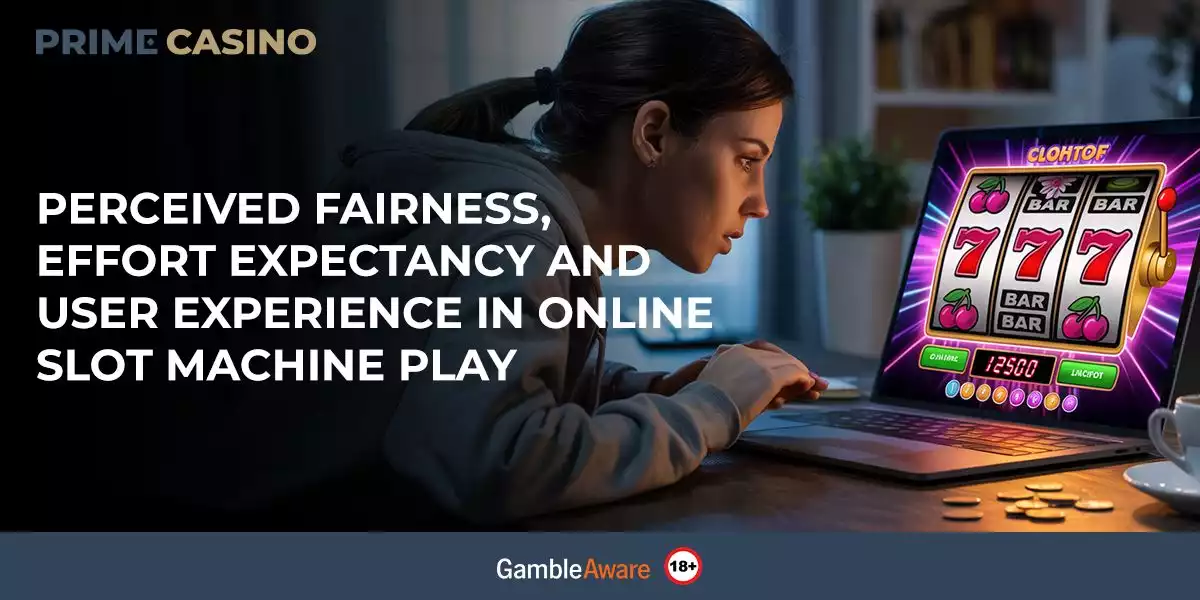In a multibillion business driven by fast technological advancement like gambling, research on the players’ gambling intention is important for marketers and regulators, on the one hand, and for the academic field of problem gambling, on the other hand.
Slots became the most popular gambling game in present days, with a wide palette of versions and characteristics. This popularity and variety are the effect of the advanced technology standing behind their conception; however this technology itself is often questioned for fairness and adequacy by both players and experts. Such concerns of course impact slot players’ gambling behavior.
A study conducted in 2018 by two researchers at University of Technology in Luleå (Sweden) investigated how gambling intention in online slot machine play is influenced by three factors – perceived fairness, effort expectancy, and user experience.
The results of this study – useful for the operators’ policies, but also for the problem gambling research – indicated that perceived fairness impacts gambling intention directly and strengthens the effect of effort expectancy on gambling intention. However, user experience weakens both these impacts.
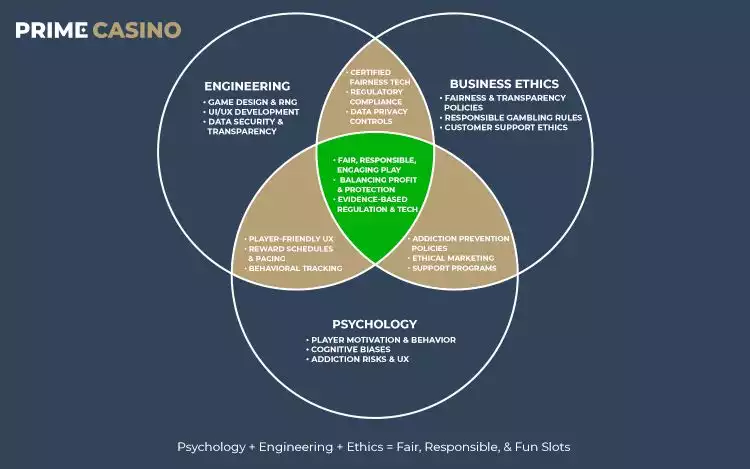 Psychology + Engineering + Ethics = Fair, Responsible, & Fun Slots
Psychology + Engineering + Ethics = Fair, Responsible, & Fun Slots
Multidisciplinary approach of the online gambling business
The online gambling industry is a fast-growing business, characterized by increasingly aggressive marketing among the online gambling companies, as they compete for players and market share. The games offered are not essentially different, hence the expected effort required to master a certain online game is decisive to the resultant experience of a player and therefore is a key factor in competition.
Trust and fairness of the gambling products offered are a concern for both players and regulators. In an industry where random number generators and slot machines dominate and make the rules, players must be convinced that they are treated fairly and the product or services they buy are transparent. Thus, lawmakers, regulators, and licensing bodies take fairness and transparency as key criteria of their rules and decisions.
On the other hand, problem gamblers continue to invest time and money on gambling, many times excessively, despite experiencing harmful consequences. Recreational (non-problematic) gamblers play for fun and entertainment and typically do not risk more than they can afford.
In psychology, problematic gambling behavior is investigated from various perspectives; among them, the ethical perspective is shared with the discipline of economy, more precisely the business ethics. Both problem and recreational gamblers are concerned with the fairness of internet gambling, especially online slot machine play.
Despite its importance, the fairness of customers towards operators has received more attention in engineering and computer science and less in the academic research dedicated specifically to online gambling.
The presented study brings an important contribution to the better understanding of the role of perceived fairness and effort expectancy on online gambling intention, while accounting for the relationships of these impacts with the factor of user experience.
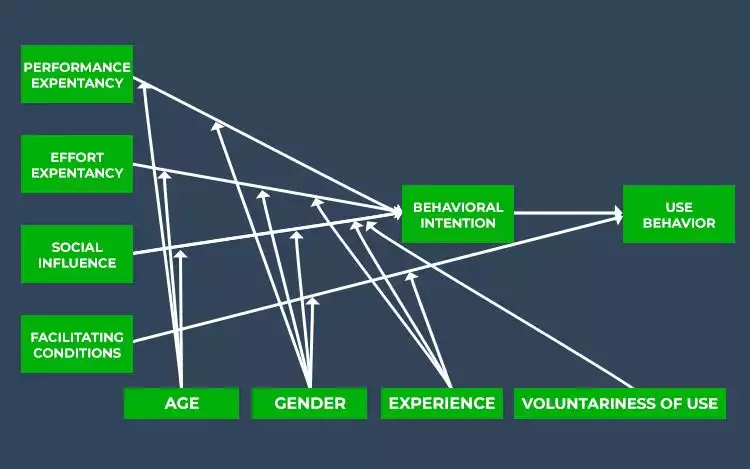 UTAUT Model
UTAUT Model
Definitions, theoretical models, and hypotheses
In the psychology of technological consumption, several theoretical models have been developed to understand purchase intention. In 2003, a theory synthesizing all salient models was proposed, called the Unified Theory of Acceptance and Use of Technology (UTAUT). The authors of UTAUT identified four key factors driving the behavior intention: performance expectancy, effort expectancy, social norms, and facilitating conditions. As for moderating variables, they identified gender, age, experience, and voluntariness of use.
Several studies on gamblers’ attitude towards internet gambling have been conducted over the last two decades. Some reported that many online players have concerns about online casinos paying out the winnings and ensuring fairness of the games. A study in 2013 reported a substantial proportion of players holding the belief that there is an (incredible) “on/off” switch used by casinos to cheat their customers.
Effort expectancy is reported as having the strongest impact on intention, while experience as a moderator is a pertinent variable in the online gambling context.
Perceived fairness is defined generally as one’s perception about the output/input ratio, the procedure producing the outcome, and the quality of interpersonal treatment. Relevant for the online gambling context are three dimensions of this perceived fairness, namely distributive, procedural, and interactional fairness: Distributive fairness refers to how the players’ expectations are being met. Procedural fairness refers to the players’ perceived ability to complain and get in contact with representatives. Interactional fairness refers to how fair customer service representatives treat players.
The authors of the presented study hypothesized that:
- H1: Higher perceived fairness leads to higher online gambling intention.
- H2: Lower effort expectancy leads to higher online gambling intention.
As an alternative mediated hypothesis reflecting how perceived fairness impacts online gambling intention and how it relates to effort expectancy, the authors proposed:
- H1alt: As users expect online gambling to require more effort, perceived fairness becomes a stronger driver of online gambling intention.
As for the role of user experience, the authors hypothesized that:
- H3a: User experience weakens the impact of effort expectancy on gambling intention.
- H3b: User experience weakens the impact of perceived fairness on online gambling intention.
- H3c: User experience weakens the impact of perceived fairness on effort expectancy.
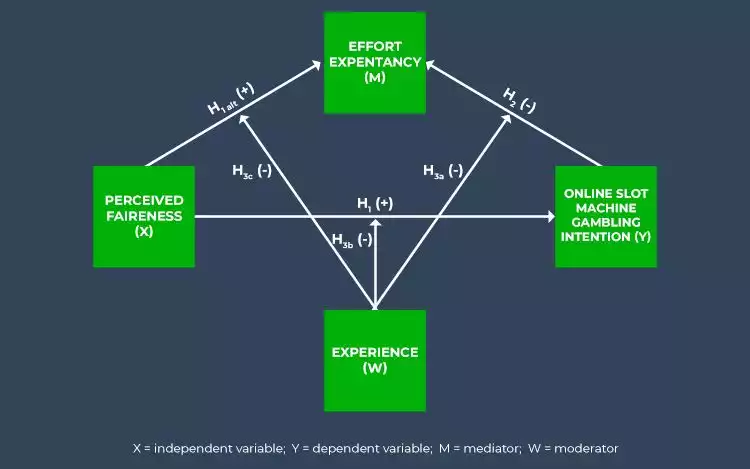 Research model with hypotheses.
Research model with hypotheses.
Setup and methodology
The questionnaire used in this study consisted of 21 items, of which 17 to capture the investigated constructs and 4 to capture demographics for user experience, age, gender, and residence. User experience was measured by asking participants to declare the number of years they had been gambling online. Perceived fairness was measured by a 10-item questionnaire. All items were measured with a 7-point scale ranging from 1 = ‘strongly disagree’ to 7 = ‘Strongly agree’. For the effort expectancy, the questions were so formulated that, the higher the value, the stronger it is expected that effort will be low. Thus, a high score on the first effort expectancy question, reading ‘My interaction with an online gambling system needs to be clear and understandable’, means that a low level of effort is required.
The research was conducted on a random sample of 2,000 online gamblers as the customers of a gambling company registered in Malta and having international reach, which was willing to allow the forwarding of the research instrument to their customers.
Data analyses started by providing descriptive statistics for the collected data, then factor analysis and reliability testing. Finally, the moderated-mediation hypotheses in the research model were tested via two concurrent regressions.
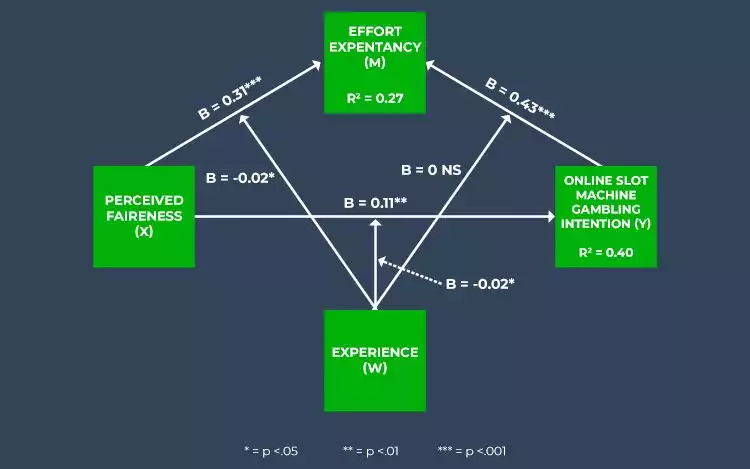 Research model with results.
Research model with results.
Results of the study
Respondents were aged 18 to 88 years, with a mean age of 34.91, of which 50% were male. Reported experience with online gambling ranged from less than 1 year to 11 years, with a mean of 3.18 years.
The results of the preliminary tests indicated the existence of sufficient correlations in the collected data, which are able to provide support for its investigation via factor analysis.
The results of the moderated-mediation multiple regression analyses indicate that the effect of perceived fairness on gambling intention is partially mediated via effort expectancy and provide support for the H2 and H1alt hypotheses.
The resultant parameters show that the magnitude of the direct effect of perceived fairness on gambling intention is 0.11, but at 0.13 its indirect effect via effort expectancy is stronger.
Surprisingly, the results do not provide support for H3a, which holds that user experience weakens the impact of effort expectancy on gambling intention. This could be explained through the constant changes that online gambling companies undertake with the introduction of new and improved design for their sites, which requires additional learning that in turn renders previous experience of limited use.
Instead, both the H3b and H3c hypotheses are supported, so that the user experience weakens the impact of perceived fairness on gambling intention and on effort expectancy. Players with higher experience give less importance to fairness and effort expectancy than less experienced or novice players.
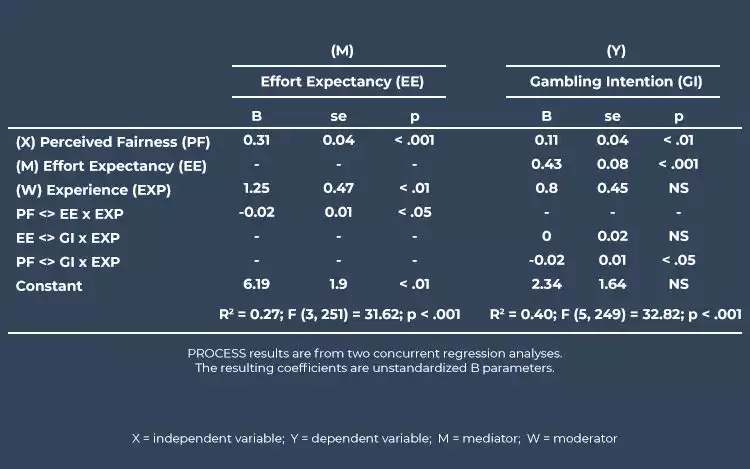 Results from moderated-mediated multiple regression analysis using Hayes' (2013) PROCESS Macro.
Results from moderated-mediated multiple regression analysis using Hayes' (2013) PROCESS Macro.
Conclusions and implications
According to the results of this study, for every unit increase in perceived fairness, there is a 24% increase in intention to gamble online. The result obviously has implications from a commercial perspective, supporting gambling companies’ investments in enhancing perceived fairness and lowering effort expectancy. Such actions require that front-end systems should be more customer-driven, while not remaining solely the task of technical developers.
The mean data show that the perceived fairness items have the lowest scores. Improving them requires focus on the activities captured by the dimensions of perceived fairness. To improve distributive fairness it is not sufficient to enhance the offerings in this respect, but to also convince players that their transactions are being handled carefully and quickly. Procedural fairness, as a key consumers’ concern, need to be embraced also by companies and not only regulators. With respect to interactional fairness, systems can be enhanced not only via technical improvements, but also by empowering policies and activities dedicated to communication of a company’s interest in providing a fair deal.
The study did not find a weakening effect of the user experience on the impact of effort expectancy on gambling intention, as other studies suggested. Instead, the results show that user experience does weaken the impact of perceived fairness on both effort expectancy and gambling intention. This could be explained by the fact that experienced users have already convinced themselves that a system is fair, regardless of whether it actually is or is not. Perceived fairness is more important to novice players, who may have higher expectations of fairness because the system is relatively unknown to them.
From a problem-gambling perspective, the results of the study indicate that the factors of perceived fairness, effort expectancy, and user experience, along with their mutual relationships, should be employed in the research on problematic gambling behavior. Especially in the case of online slots, where the technology is essential and responsible for both the functioning of these games and their specific harmful effects on players, players’ perception of these factors is supposed to drive both their behavior and the resistance to developing problem gambling.
References:
Chiu, C.-M., Lin, H.-Y., Sun, S.-Y., & Hsu, M.-H. (2009). Understanding customers’ loyalty intentions towards online shopping: An integration of technology acceptance model and fairness theory. Behaviour & Information Technology, Vol. 28, 347–360.
Cook, C. (2017, July 17). Sarah Harrison the punters’ champion at the gambling commission. Retrieved July 23, 2017, from https://www.theguardian.com/sport/2017/jul/17/sarah-harrisonfighting-for-punters-gambling-commission
Gainsbury, S. (2012). Internet gambling: Current research findings and implications. New York: Springer.
Gainsbury, S., Parke, J., & Suhonen, N. (2013). Consumer attitudes towards internet gambling: Perceptions of responsible gambling policies, consumer protection, and regulation of online gambling sites. Computers in Human Behavior, Vol. 29, 235–245.
Konietzny, J., & Caruana, A. (2019). Fair and easy: the effect of perceived fairness, effort expectancy and user experience on online slot machine gambling intention. International Gambling Studies, 19(2), 183-199.
Oliveira, T., Faria, M., Thomas, M. A., & Popovič, A. (2014). Extending the understanding of mobile banking adoption: When UTAUT meets TTF and ITM. International Journal ofInformation Management, Vol. 34, 689–703.
Venkatesh, V., Morris, M. G., Davis, G. B., & Davis, F. D. (2003). User acceptance of information technology: Toward a unified view. MIS Quarterly, Vol. 27, 425–478.
Wood, R., & Williams, R. (2009). Internet gambling: Prevalence, patterns, problems, and policy options (Final Report prepared for the Ontario Problem Gambling Research Centre). Guelph, Ontario: Canada.
Written by:
Prime Casino Editorial Team
At Prime Casino, our editorial team is passionate about bringing you a wide range of high-quality content focused on all things casino and more. From in-depth game guides to tips and strategies for maximising your gameplay, we cover everything you need to provide a casino experience transcending the ordinary. We are dedicated to promoting responsible gaming while delivering engaging and informative content to both new and experienced players alike.
